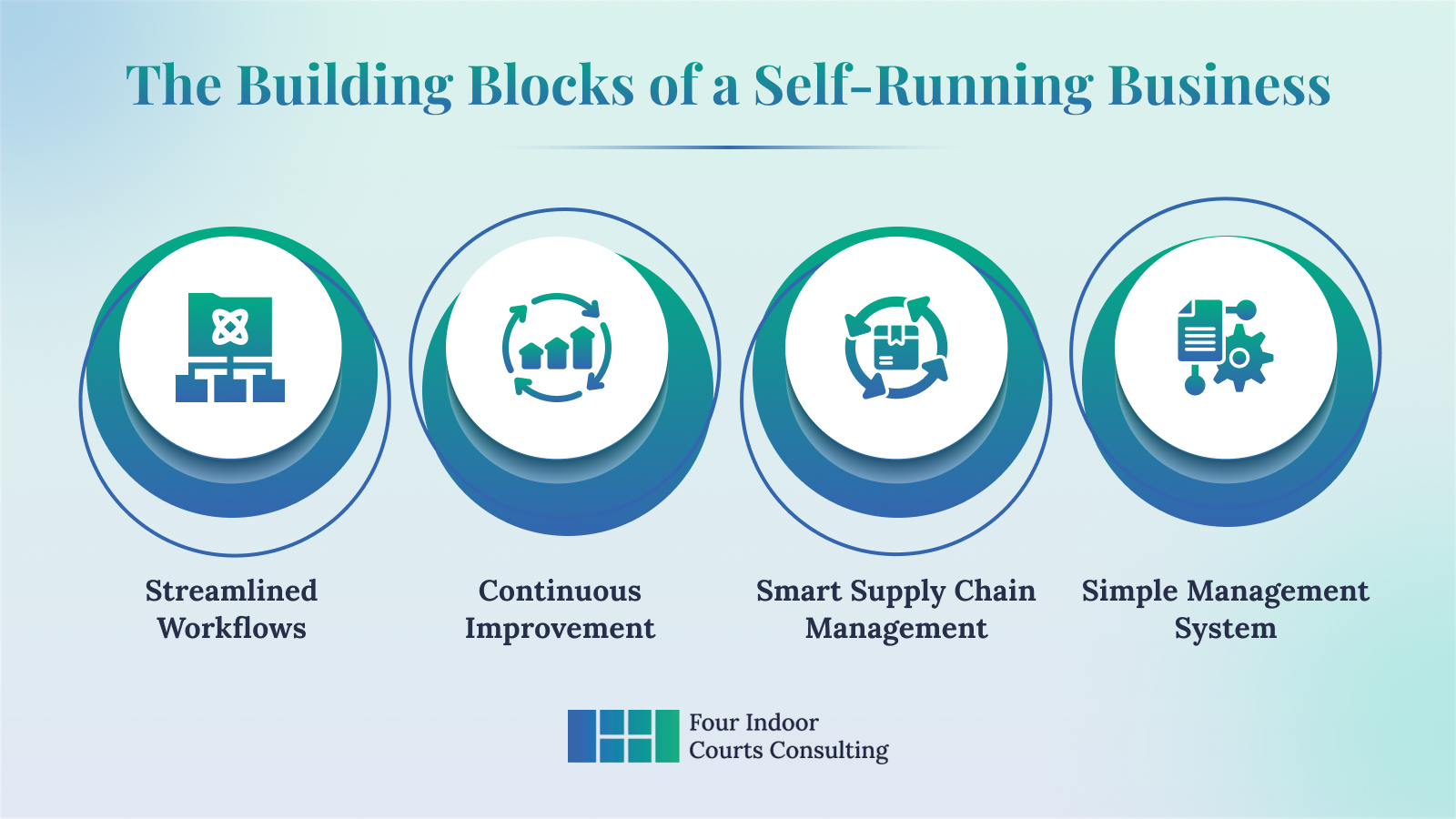Operational Excellence Consulting: How Small Businesses Create Big Gains

Off your baseline? Take 5 minutes and get back in the game.
You might be feeling like your leadership skills are not up to it, that you're the reason why the business is stalled, or that if only there were more of 'you', everything would grow! Well, let's take 5 to look at it a bit differently and see how becoming more 'operationally excellent' might be your silver bullet (and your competitive advantage!).
We’ll look at how some continuous improvement, a clear management system, and small process changes add up to big wins. This is your insight into long-term stability, happier teams, and measurable results.
“Operational excellence isn’t about doing more, it’s about doing what matters, brilliantly, every single time and having other people that can repeat that performance for you.” Leah Norris, Founder, FICC
Your key Takeaways
- Operational excellence is a simple structure that keeps your team focused and your work consistent.
- Continuous improvement means fixing small things fast before they become big ones.
- A clear management system gives everyone the same playbook: what to do, when, and how success is measured.
- Operational excellence consultants help SMBs scale faster by embedding repeatable habits.
- The result: less stress, stronger margins, better customer experience, and more time to grow.
“Before this, I spent half my week solving the same problems. Once we set up a steady management rhythm, profits rose eight percent, and I got my Fridays back!” Frank Adler, Manufacturing CEO, Fort Myers, FL
Why It Matters
Companies with mature operational excellence initiatives are 30–50 % more productive and keep customers longer. (IndustryWeek 2025)
In today’s super competitive environment (whatever your sector), smaller companies face the same pressure as the giants – tight labor, demanding clients, constant change. The difference is that SMBs win through simplicity and structure: clear processes, strong communication, and accountability. It's just a problem-solving process.
What Operational Excellence Really Looks Like for Small Businesses
Forget buzzwords and all the scary jargon; an operational excellence strategy simply means running your business on purpose instead of reacting to every crisis, every day. It’s about replacing chaos with clarity and guesswork with systems and giving you, your desired outcomes.
The building blocks are straightforward:
- Clear roles and ownership.
- Visible goals and metrics.
- Short, focused meetings that end in decisions.
- A culture that fixes problems once, not endlessly revisiting them.
That foundation delivers process excellence and consistent, high-quality results without burning people out.
The Building Blocks That Keep Your Business Running (even when you’re not there)

1. Streamlined Workflows
Document how things really get done, not how you think they do.
2. Continuous Improvement
Encourage everyone to raise issues early. Quick daily huddles let teams spot and signal small errors before they grow costly.
3. Supply Chain Management for Small Teams
Track what’s late, what’s critical, and who’s responsible. Better supply chain management - whether you have two suppliers or 20! - gives small firms agility, big players envy.
4. A Simple Management System
Weekly reviews, visible KPIs, and a clear rhythm make progress measurable. These building blocks of operational excellence replace confusion with accountability.
The Simple Management System That Scales With You
Operational excellence depends on rhythm:
- Daily: talk about yesterday’s wins and today’s blockers.
- Weekly: review numbers and next steps.
- Monthly: capture lessons and lock improvements.
That cadence forms your management system. It keeps business process improvement alive without extra layers of management. Every discussion links back to clear business objectives like delivery time, margin, or keeping your clients happy.
Operational Excellence in Action: Small-Business Case Studies

Manufacturing Operational Excellence Consulting
A regional metalworks business with 45 employees was struggling with missed delivery dates and frustrated staff. Jobs sat in limbo between departments, and no one owned the schedule.
Working with a Fractional COO, the owner started with a simple visual management system - a wall board showing every order, stage, and blocker. Supervisors met for ten minutes each morning to update status and solve issues.
Within six weeks, daily bottlenecks became visible for the first time. Teams began fixing problems before they snowballed. The business cut average job lead time by 18%, increased on-time delivery by 22%, and turnover dropped as employees felt more in control of their work.
“We didn’t buy software or hire managers — we just made the work visible,” the owner said. “Now everyone knows where we stand every morning.”
Service Organizations and Customer Support
A growing customer-support agency with 20 reps faced rising ticket backlogs and repeat complaints. Calls were logged inconsistently, and responses varied by who picked up the phone.
The team began with a short business process improvement exercise: mapping the customer journey from first call to resolution. Together, they defined clear ownership; who takes the issue, who escalates, and what 'resolved' actually means.
They introduced a shared dashboard showing open tickets by age, category, and client. Weekly 15-minute reviews kept accountability front and center.
Within eight weeks, response time improved by 40%, backlog was cut in half, and customer satisfaction scores climbed sharply. The owner noted:
“We didn’t need more people. We needed a better way to see the work. Once we had that, everything moved faster.”
Product Development in Medium-Sized Manufacturing
A 60-person plastics manufacturer kept missing new-product launch dates. Designs were passed by email, revisions got lost, and production rarely had the latest specs. Each delay costs sales and credibility.
The leadership team shifted to focus on communication flow and cross-department visibility. They set up one shared product tracker (design, tooling, testing, and sign-off), updated daily by whoever owned each stage.
They also created short weekly huddles between sales, engineering, and production to review progress and unblock decisions.
Within three months, rework dropped by 30%, average time from concept to prototype shrank from 14 to 8 weeks, and the team described the atmosphere as 'calm and controlled, not panicked.'
“It used to feel like we were reinventing the wheel every project,” said the operations lead. “Now, everyone knows the play and who’s serving next.”
Partnering for Progress - without the corporate overhead

You don’t need a full-time Vice President of Operations. You need advisory services that fit your scale. That’s what FICC provides - fractional, focused help that builds systems and skills. Holding your hand, acting as your sounding board, and stepping in to 'do the do' when you need it.
We start with your business needs, find improvement opportunities, and create a rhythm your team can own.
“Most of our clients already have the right people — they just need the structure to let those people perform.” Leah Norris, FICC
Building Capability, Not Dependency
- Change Management That Sticks: People adopt what they help create. The FICC change management approach builds confidence and quick wins so improvements last.
- Decision-Making and Best Practices: Clarity beats complexity. Define who decides what, capture proven best practices, and share them widely; that's how small businesses stay consistent as they grow.
- Performance Management for High-Quality Results: Simple dashboards and short reviews keep attention on what matters. Strong Performance Management links every metric to your operational goals and business strategy.
The Playbook for Long-Term Success
Sustained success comes from repetition. Keep your Management System simple, teach new hires through short e-learning modules, and keep growing leadership through targeted training material and coaching.
That’s everyday business transformation; small steps, done consistently, producing long-term stability.
Final Word
If your business only runs when you do, it’s time to build a system that runs itself.
You’ll trade stress for structure, confusion for clarity, and constant catch-up for calm control. And when that happens, you can finally step back and focus on growth.
Operational excellence is how small businesses achieve big-business results, without losing their life balance.



.jpg)
